INTESTINAL OBSTRUCTION - SYMPTOMS, CAUSES, COMPLICATIONS, AND TREATMENT.
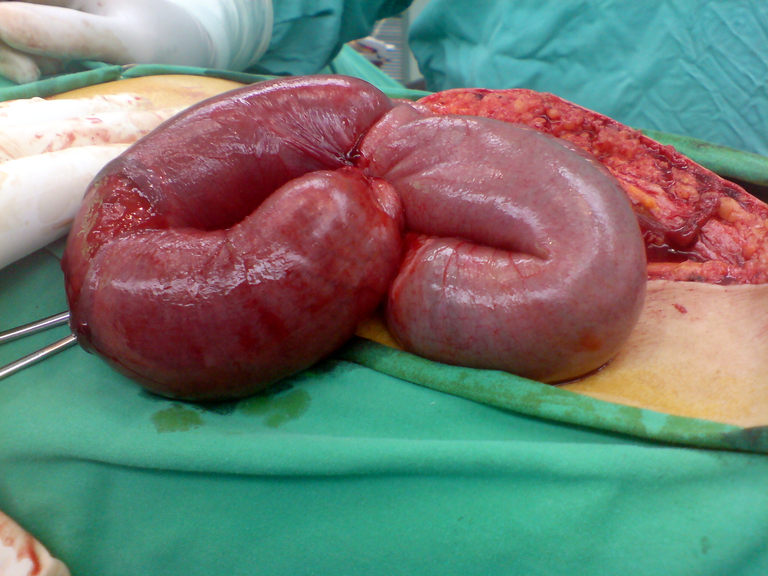
By haitham alfalah, CC BY-SA 3.0, Wikimedia
Intestinal obstruction is a clinical condition that occurs when there is a stoppage of the forward movement of the contents of the intestine. Normally, when we eat food, the digestive tract is made in such a way that the food and other contents of the intestine move onward from the mouth to the esophagus, from the esophagus to the stomach, then the small intestine, large intestine, and final exit through the anus when the digestive process is completed.
However, if for any reason, there is an obstruction to this forward flow of intestinal contents, it is regarded as intestinal obstruction. This is a serious condition associated with many complications, some of which are life-threatening.

SYMPTOMS OF INTESTINAL OBSTRUCTION

The symptoms of intestinal obstruction are classical. They usually come with symptoms of vomiting, constipation, abdominal pain, and or abdominal distension.
It is obvious why these symptoms occur because once there is an obstruction of the intestine, the contents cannot move forward and they keep accumulating backward towards the mouth. This leads to vomiting in an attempt to relieve the accumulated load of intestinal contents. This vomiting is usually bilious since intestinal obstruction occurs below the point of exit of the common bile duct called the ampulla of the vater.
Due to this obstruction, nothing moves towards the exit point at the anus and this manifests as constipation. The patient cannot pass feces and or flatus due to the obstruction.
The abdominal distension noticed in this patient is due to the accumulated intestinal contents. As they keep accumulating, the intestines bulge and enlarge, which manifests as abdominal distension.
The abdominal pain is due to the peristaltic movements of the intestine in an attempt to propel the contents forward against the resistance of the obstruction. This leads to abdominal pain and the pain is usually aggravated by feeding.
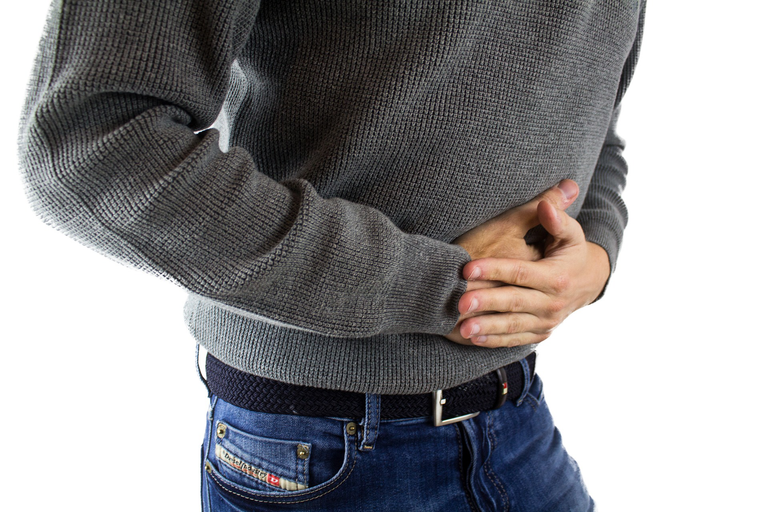
By Darko Djurin, CC0, Wikimedia
Apart from these 4 classical symptoms of intestinal obstruction described above, there may be other associated symptoms, especially when complications have set in. Some of the associated symptoms include fever, reduced urine output, headache, weakness, general feeling of unwell, etc.

CAUSES OF INTESTINAL OBSTRUCTION

Intestinal obstruction can be mechanical or functional. In mechanical obstruction, there is something that is blocking the intestine. However, in functional obstruction, nothing is blocking the intestine but the muscles at the walls of the intestine are weak and cannot contract to propel the intestinal contents forward.
Mechanical intestinal obstruction:
As described above, in mechanical intestinal obstruction, there is 'something' that is blocking the intestine which can be inside, within, or outside the intestine. Some of these causes of intestinal obstruction are;
Bands and adhesions - Bands and adhesions are among the commonest causes of intestinal obstruction. These adhesions result from previous abdominal surgeries, gynecological surgeries, previous inflammation of the peritoneal lining (peritonitis), and some gynecological conditions like pelvic inflammatory disease, etc.
Hernia - As I stated in my previous post on hernia, a hernia occurs when a viscus or part of a viscus protrudes through a weakness in the wall of its containing cavity. This protrusion can be reduced back to its cavity, however, sometimes the protruding viscus can get trapped in the defect. Here, it becomes irreducible and painful and obstructs the onward movement of the intestinal contents (intestinal obstruction).
Faecal Impaction - This is another cause of intestinal obstruction which occurs when a hard mass of stool gets stuck in the intestine. This occurs commonly following chronic constipation and also in people who consume a low-residue diet. This large mass of stool blocks the movement of intestinal contents and causes intestinal obstruction.
Tumour - Cancers can also grow in the intestine and obstruct the onward flow of intestinal contents.
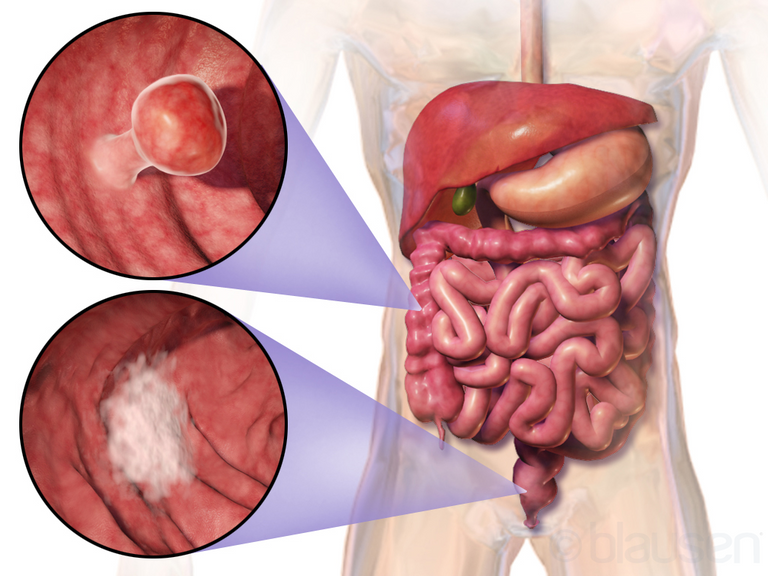
By Blausen Medical Communications, Inc. -CC BY 3.0, Wikimedia
Other causes of intestinal obstruction include worms like ascaris, gall stones, foreign body impaction, polyps, strictures, stenosis, volvulus, intussusception, etc.
Functional Intestinal obstruction:
In functional intestinal obstruction, nothing is blocking the intestine but the muscles of the wall of the intestine are weak and cannot contract to move the intestinal contents forward.
This occurs following some conditions like abdominal surgery where the intestines are handled. The intestine loses its movement after the surgery and it takes about 12 to 72 hours for full peristalsis to return. Food eaten within this time will cause stasis since the muscles of the intestine cannot contract to propel the food forward. This is why patients are usually not allowed to eat solid food after abdominal surgery for about 2 - 3 days depending on the nature of the surgery till peristalsis returns.
Other causes of functional intestinal obstruction include infection of the peritoneum (peritonitis), low potassium levels in the blood (hypokalaemia), etc.

COMPLICATIONS OF INTESTINAL OBSTRUCTION

Intestinal obstruction is a serious condition and can be associated with life-threatening complications or even death if not addressed immediately.
The stasis of food in the intestine causes bacteria growth which leads to gas production and fluid accumulation. This fluid accumulation in the intestine leads to low fluid volume in circulation since a percentage of the body fluid is trapped inside the intestinal lumen. This is referred to as 3rd space loss.
Due to the low volume of fluid in circulation, there is dehydration and resultant electrolyte imbalance. Remember, that the major electrolytes in the body like sodium, potassium, chloride, etc need fluids to maintain their balance.
As the low circulating fluid volume (hypovolemia) progresses, it leads to shock and shut down of vital organs like the kidneys - acute renal failure.
The accumulated fluid and gas in the intestine leads to increased bowel wall pressure, venous congestion, and the occlusion of the vessels (arteries) supplying the intestines. This leads to a shortage of blood supply to the intestine (bowel Infarction). As it progresses, it leads to bowel gangrene and a bowel perforation. When the bowel perforates, it pours its contaminated contents into the sterile peritoneum which leads to the infection and inflammation of the peritoneum (peritonitis).
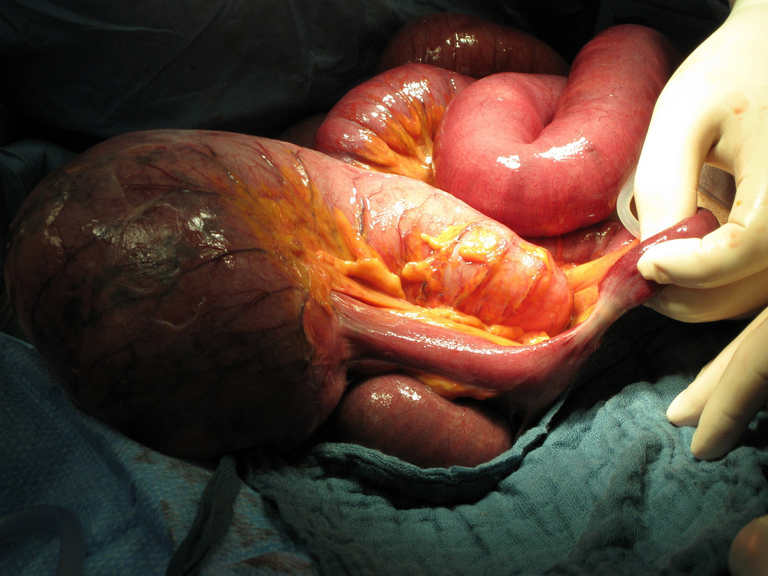
By Thomas Zimmermann (THWZ) - Own work, CC BY-SA 3.0 de, Wikimedia
When this progresses, it can lead to infection of the abdominal organs and possible contamination of the blood by microorganisms (septicemia). This can lead to septic shock and death.
So, the end product of intestinal obstruction can be fatal and urgent action must be taken not to get to this stage.

TREATMENT OF INTESTINAL OBSTRUCTION

The treatment of intestinal obstruction starts with adequate resuscitation of the patient. This involves stopping every intake by mouth, using a nasogastric tube to decongest the abdomen, adequate intravenous fluid to compensate for the hypovolemia, Intravenous antibiotics to address the bacteria growth on the accumulated food contents in the intestine, adequate monitoring, etc.
The main treatment can be non-surgical or surgical depending.
In non-surgical treatment, the patient is monitored closely for the progression of symptoms following adequate resuscitation. Then oral intake can be commenced gradually and a high fiber diet later on. For fecal impaction, soap and water enema or osmotic laxatives can be used.
Surgery remains the definitive treatment when indicated. Some of the indications for surgery include failure of the conservative management described above, when there is evidence of perforation of the intestine, infection of the peritoneum, etc.
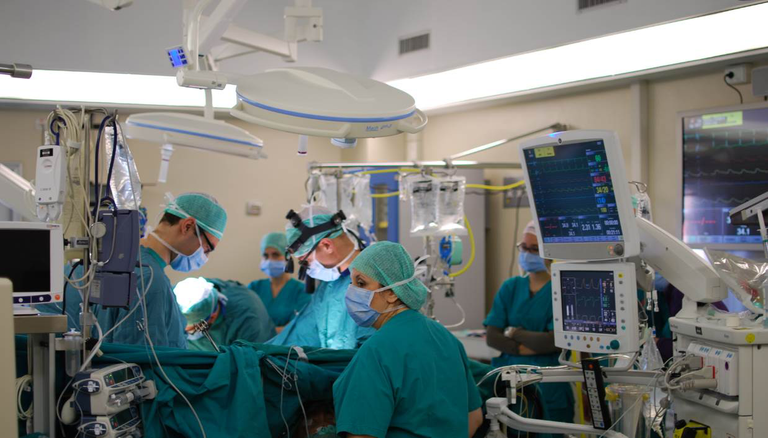
By Pfree2014 - Own work, CC BY-SA 4.0, Wikimedia
In the surgery, the abdomen is opened up in a procedure called exploratory laparotomy and the cause of the intestinal obstruction is treated.

CONCLUSION

Intestinal obstruction is a serious clinical condition that has many causes, some of which are easily preventable. The classical symptoms are usually vomiting, constipation, abdominal pain, and abdominal distension as well as other symptoms depending on the presence or absence of complications.
Immediate treatment should be instituted when noticed early to avoid complications. Further delay might lead to serious complications or even death.
Measures should also be taken to prevent intestinal obstruction like regular deworming especially predisposed individuals, avoiding a low fibre diet, adequate fluid intake, etc.
Thanks so much for reading.
For references and further reading, please check the materials below;
This can be a very disturbing condition and its treatment for me still has to be debated. Watching the patients before treating in cases of non-surgical approach for me isn't the best, in such case, surgery is preferable to prevent complications that might arise from watching the patient for progression.
Yes, you are very correct ma. I once raised a similar concern in a surgery ground rounds but the argument was that for those who have intestinal obstruction due to adhesions for instance, going in for surgery is another risk factor for more adhesions and possible another intestinal obstruction in the future.
Also, cases of fecal impaction can benefit more from soap and water enema and laxatives more than sugery, unless the conservative management fails.
Though, I agreed with the consultant's view, however, I still believe that early Surgery will save these patients from the possible complications from a failed conservative management as you rightly stated.
Thanks for your wonderful contribution ma.
This debate has been standing for a long time, I also see reasons for treating without invasion, I just believe surgery would save a life and reduce complications. Thanks a lot for replying
Very correct. You're welcome ma. Many thanks 🙏
I know a number of patients that died as result of this. Can be terrible when not diagnosed and treated ASAP.
Yes exactly. The complications of intestinal obstruction can be life-threatening and even fatal if not treated immediately. Early detection and prompt treatment remains the key to a better outcome.
Thanks so much for your valuable contribution sir.
Thanks for your contribution to the STEMsocial community. Feel free to join us on discord to get to know the rest of us!
Please consider delegating to the @stemsocial account (85% of the curation rewards are returned).
Thanks for including @stemsocial as a beneficiary, which gives you stronger support.
Thanks so much for the support @stemsocial . I appreciate 🙏